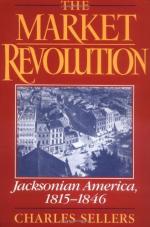
|
| Name: _________________________ | Period: ___________________ |
This quiz consists of 5 multiple choice and 5 short answer questions through Chapter 11, Ambiguous Democracy.
Multiple Choice Questions
1. How does Sellers say the Republican pro-market forces counteracted anti-market forces?
(a) By buying or suppressing their votes.
(b) By rigging elections against their candidates.
(c) By making compromises with them.
(d) By getting them to support Republicans.
2. What philosophy informs Sellers's chapter on the Second Great Awakening?
(a) Historical view of religion as an institution among institutions.
(b) Philosophical view of religion as meaning-making.
(c) Nietzsche an concept of morality as the product of class interest.
(d) Marxist concept of religion as a reaction to social trends.
3. According to Sellers, what changed the cost of labor, in Jackson's America?
(a) Population explosion.
(b) Territorial expansion.
(c) Democratization.
(d) Militarization.
4. Who felt threatened by the market revolution, according to Sellers?
(a) Big merchants.
(b) Large landholders.
(c) Commercial groups.
(d) Investors.
5. How did Biddle ultimately make sure the Federal Bank would die, in Sellers's account?
(a) He overplayed his hand.
(b) He played his policies just right.
(c) He neglected to consider the cost of the federal debt in debt maintenance.
(d) He mismanaged the monetary supply.
Short Answer Questions
1. Where did democratic sentiment exist in the south, in Sellers's account?
2. When does Sellers date the beginning of the Jacksonian era?
3. What did the First Bank of the United States do to the economy?
4. How did consumerism change as a result of the financial crash?
5. What does Sellers say happened to debtors when the economic crashed?
|
This section contains 285 words (approx. 1 page at 300 words per page) |

|




